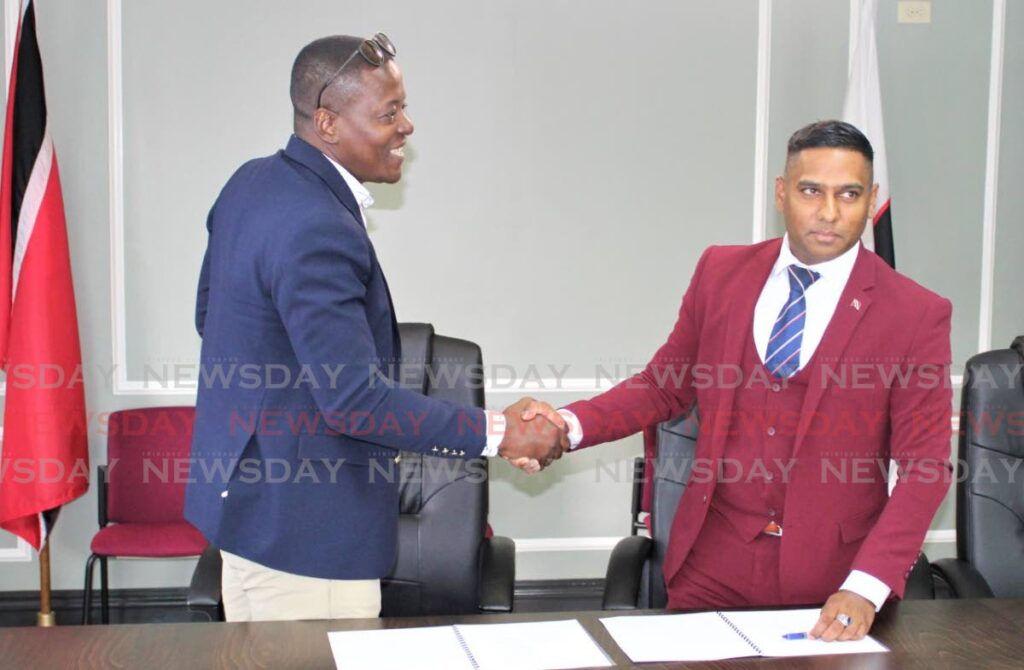COPS WINE WITH 4% – CPO, union sign off on salary deal

PRESIDENT of the Police Service Social and Welfare Association ASP Gideon Dickson said accepting the Chief Personnel Officer's (CPO) four per cent offer was a strategic move of taking less than police are worth in hopes of getting a better offer for a second negotiating period.
Speaking with Newsday on Friday after the official signing of the wage agreement, Dickson said the agreed-on period of 2017-2019 has long gone, and with the 2020-2022 period still to be negotiated, it was better to accept the four per cent offer now, understanding the economic climate of the country.
“We are not saying that we would have gotten just due for the period taken place in terms of what we are valued but, what we will say is that we got the best out of a bad situation, knowing fully well that better lies ahead.”
Friday’s signing came after the association received a mandate from the membership agreeing to accept the offer last November.
In his budget presentation last year, Finance Minister Colm Imbert said the government was only prepared to offer a four per cent wage increase for 2014-2019.
The offer was accepted by the Amalgamated Workers Union on August 29 and in November the Defence Force accepted the offer. The Defence Force was the first of the protective services to accept.
During his presentation, Imbert said negotiations between four unions – the Prison Officers Association, the Trinidad and Tobago Unified Teachers Association (TTUTA), police and the TT Fire Service Association – and the CPO, Dr Daryl Dindial, had been sent to a special tribunal of the Industrial Court. He said discussions could go no further, adding that the government’s offer for two negotiating periods remains on the table for any one of the unions to accept and end its respective tribunal.
Dickson, on Friday, said his members based their decision on “the economic information” and the fact that there was another bargaining period “where potential lies there to benefit greater from.
“Our members, educated and analytical, understanding the variables we are working with, found it in our best interest to do this at this point in time, as opposed to fighting for a period that is long gone.”
While Dickson said his union looked at the economic standing of the country to agree to the offer, president of the Fire Association Leo Ramkissoon said the same economic vantage point is the reason to reject the offer.
He said since negotiations began, the Government boasted of increased revenues and yet is still imposing a four per cent offer.
“Our position has not changed and have come to terms that our government, who purports to care about our workers, hastily referred this to the court without a genuine attempt to negotiate a fair judgement.
"Our membership has given us our mandate, which is to hold our position and go through the courts and see where that will lead. We cannot accept what will effectively be a wage cut when looking at the increased cost of living.”
He said fire, like all other unions before the CPO, were similarly circumstanced, adding that the action of any one union is likely to affect the others in the struggle.
Newly elected president of the Prison Officers Association Gerard Gordon told Newsday that his membership will have to instruct him to accept the offer and he is yet to meet with them. Gordon was elected on February 10 and, after recounts, was officially announced the winner last Friday.
After the Amalgamated Workers Union accepted the offer, other unions considered it a betrayal and labelled it a sell-out.
Asked if this sentiment was now being extended to police, Gordon said: “For me, as head of the association, I am not interested in any discourse that will not add value in our mandate, and whether someone sells out or not, it is of really no concern to me. They could do what they have to do and I will do what I have to do.”
Dickson, when asked for his defence against such an attack, said the police service at this time was more focused on crime and crime management to argue with anyone over “perceived selling out.”
“We at no point in time were part of any action taken by anyone else. The membership had issues at one point with the four per cent and after taking into consideration all the variables, the membership gave a different mandate and we accepted the mandate.”
Dickson said the only hurdle his union had was the wage increase, as all other issues were resolved.
In a media release on Friday, the CPO listed other things that the two agreed to. They were: a lump-sum payment of $4,000 to officers who retired on the grounds of illness for the period 2014-2015; adjustments to uniform, meal, laundry, specialisation, travelling and cost of living allowance (COLA) allowances; and a job-evaluation exercise beginning next year that will take them to the international market rate.
The release added that in November 2022, the association also signed off on a grievance procedure for its members which will be implemented by the end of March.

Comments
"COPS WINE WITH 4% – CPO, union sign off on salary deal"